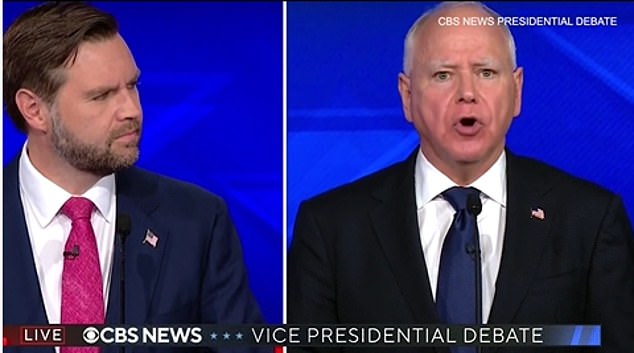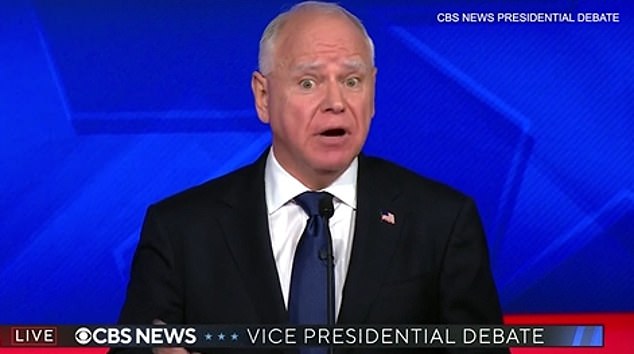Tim Walz was left blushing in last night’s debate after being challenged for a lie about his stay in Hong Kong during the Tiananmen Square massacre.
“I got there that summer and I was wrong about this,” the Democratic vice presidential hopeful said before trailing off in confusion.
For years, he had claimed that he was there when the Chinese government violently suppressed the pro-democracy movement in June 1989.
But it recently emerged that although he was actually in Hong Kong that year, he didn’t arrive there until August at the earliest.
It’s just the latest in a series of “misses of expression” by Walz and psychologists tell DailyMail.com there now appears to be a pattern.
Walz is pictured above trying to deflect a question about why he lied about being in Tiananmen Square during the pro-democracy protests.
Dr. Christian Hart, a psychologist at Texas Woman’s University who has previously written about why politicians lie, suggested two theories for Walz’s embellishments.
He said: “When we look at lying, we see that people only lie when they think they will get something beneficial out of it.”
‘According to research, if there is no perceived potential benefit, people are almost exclusively honest.
“For Walz, he may believe that he gets some kind of favor in return for it, whether it’s burnishing his reputation or appearing as someone who has more expertise on a subject than he really does.”
The governor of Minnesota has repeatedly said that he used IVF to conceive his two children, which is actually not true.
Most recently, he made the claim at a joint rally with Kamala Harris in August, when there were concerns about the legality of IVF.
He also made the claim in fundraising letters published in April, which began: “My wife and I used IVF to start a family.”
But when pressed about the claims, it turned out she had actually used intrauterine insemination, or IUI, a different treatment.
In another case, Walz said in 2018, while running for Congress, that he had used “weapons of war that I carried in war” when discussing gun regulation.
But this was not true. Walz, who served in the National Guard for 26 years, was never deployed to combat or overseas, and retired from his battalion shortly before he was sent to fight in Iraq.
Another theory is that Walz, who is from a small town in Nebraska and has been catapulted to the national stage, is insecure and therefore exaggerates his accomplishments to appear more presidential.

Many viewers concluded after last night’s debate that Republican vice presidential rival JD Vance had performed better.
Dr Hart added: “One thing we also see is that people who have low self-esteem tend to lie significantly more than people who feel more confident.”
“It could be that he doesn’t see himself at the level you’d expect a presidential candidate to be at, and so he’s making some exaggerated claims to help make himself seem more like himself.”
During his 2006 congressional campaign, his team claimed that his drunk driving arrest was not due to drinking, but rather that he had failed an alcohol test due to a misunderstanding related to hearing loss from his time in the National Guard.
However, court records show he was pulled over for driving 96 mph in a 55 mph zone and then taken to a local hospital, where a test showed his blood alcohol level was .128, above the legal limit. of 0.1.
Also in the 2006 campaign, he claimed that he had received an award from the Nebraska Chamber of Commerce in 1993 for his work in the business community.
A harsh letter from the House, revealed in August and then sent to Walz’s campaign, denied this claim and stated that he had never received an award.
Ryan Waite, vice president of public affairs at corporate marketing firm Think Big, told DailyMail.com that a “worrying” pattern seemed to be emerging in Walz’s lies.
He said: “I would have put this down to inexperience a little bit, but I think there’s also a pattern now that’s starting to become a little bit deeper.”
He said, however, that Walz did not seem to lie any more than other politicians, although he added that politicians typically learn not to make these types of claims during the primary process. But with Walz, he added, there were no primaries.
“Normally, these types of issues would be resolved during the primary process before hitting the national stage,” he said.
“But with Walz, he’s been catapulted forward without the normal on-ramp.”
During the debate, Walz was criticized for appearing nervous and making unusual facial expressions.
Body language experts also noted how at times Walz’s eyes appeared to open “widely.”
Joe Navarro, published author and body language expert, said political it was a “dynamic and emphatic facial movement that captured the viewer’s attention.”
“Early humans would have made facial gestures to communicate strong emotions, such as ‘danger is near.’
“For Walz, this gave extra weight to his feelings and caught our eye.”
On the debate stage, Walz particularly faced criticism over suggestions that he had been in Tianamen Square during the democracy protests.
He obfuscated his response, calling himself a “fool” and then adding that he “gets caught up” in the moment.


